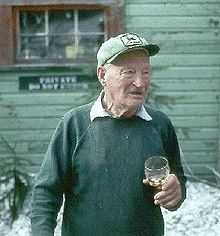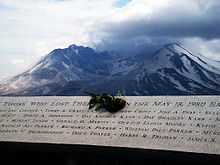Harry Randall Truman
| Harry Randall Truman | |
|---|---|
 Harry Randall Truman near his lodge on Spirit Lake, April 1980 | |
| Born |
October 30, 1896 Ivydale, Clay County, West Virginia[1] |
| Died |
May 18, 1980 (aged 83) Mount St. Helens, Washington |
Cause of death | Killed by volcano eruption Pyroclastic flow |
| Occupation | Caretaker of Mount St. Helens Lodge |
| Spouse(s) |
Helen Irene Hughes (divorced) Marjorie Bennett (divorced) Edna O. Henrickson[1] |
Harry Randall Truman (October 30, 1896 – May 18, 1980) was a resident of the U.S. state of Washington who lived on Mount St. Helens. He came to brief fame in the months preceding the volcano's 1980 eruption after he stubbornly refused to leave his home despite evacuation orders, and he is presumed to have been killed in the eruption. He was the owner and caretaker of Mount St. Helens Lodge at Spirit Lake, located at the south end of Spirit Lake at the foot of the mountain in the danger zone at the time of the eruption.
After Truman's death, his family and friends reflected on his love for the mountain. He was commemorated in a book by his niece and a song by Headgear. In 1981, Art Carney portrayed Truman in the docu-drama film St. Helens.
Life
Truman was born in Ivydale, Clay County, West Virginia,[1] to Newberry Truman and Rosa Belle Hardman. His family settled in Chehalis, Washington several years later. He had one sister, Geraldine.[1]
Truman enlisted in the 100th Aero Squadron – 7th Squad of United States Army as a private on August 4, 1917. Several months later, he survived the torpedoing of the Tuscania on February 5, 1918 off the coast of Ireland. After the incident, Truman was honorably discharged from military service on June 12, 1919. He lived in Riffe, Washington until 1926, when he became caretaker of the Mount St. Helens Lodge at the foot of Mount St. Helens beside Spirit Lake. At the time of his death, Truman had operated the lodge for 52 years.[2] He was also a member of the Tuscania Survivors Association from 1938 until his death.[1]
Truman was married three times: to Helen Irene (née Hughes), Marjorie (née Bennett), and Edna O. (née Henrickson). It is not clear when he married or separated from Hughes, but he married Bennett in 1935 and Henrickson in 1947.[1]
Celebrity
He became a minor celebrity during the two months of volcanic activity preceding the eruption, giving interviews to reporters and expressing his opinion that the danger from the volcano was exaggerated, saying, "I don't have any idea whether it will blow[...] But I don't believe it to the point that I'm going to pack up."[3] Truman discarded all of his concerns about the volcano and his situation, stating "If the mountain goes, I'm going with it. This area is heavily timbered, Spirit Lake is in between me and the mountain, and the mountain is a mile away, the mountain ain't gonna hurt me... boy." [4] According to The Bulletin, he responded to being knocked from his bed by precursor earthquakes by moving his mattress to his basement.[2] At one point, Truman "scoffed"[2] at the public's concern for his safety.[2] He became somewhat of a "folk hero"[2] and from March until May, was the subject of many songs and poems by children.[5] One group of children from Salem, Oregon sent him banners inscribed "Harry - We Love You", while Truman received fan letters[6] including several marriage proposals.[7]
Death
Truman was alone at his lodge when he is presumed to have died in the eruption on May 18.[6] A pyroclastic flow engulfed the Spirit Lake area, destroying the lake and burying the site of his lodge under 150 feet (46 m) of volcanic landslide debris.[8] A new lake eventually formed on a much higher elevation.
His sister Geraldine expressed that she found it hard to accept the reality of his death, commenting, "I don't think he made it. But I thought if they would let me fly over and see for myself that Harry's lodge is gone, then maybe I'd believe it for sure."[2]
The 1980 event was the deadliest and most destructive volcanic eruption in the history of the continental United States of America. A total of 57 people are known to have died, and more were left homeless when the ash falls and pyroclastic flows destroyed or buried 200 houses. In addition to Truman, photojournalist Reid Blackburn and volcanologist David Alexander Johnston were killed.[9]
However, Alistair Cooke, in his Letter From America dated 26 December 1980, six months after the eruption, refers to Harry Truman as "alive at 83 and well, and more irascible than ever". Cooke was initially teasing the listener that he was referring to former President Harry S Truman, but as his talk progressed it became clear that he was referring to Harry Randall Truman. Cooke referred to Truman as "now the only living person at the centre of the eruption, and (that) the state (of Washington) wants him to leave." According to Cooke, Truman "retorts, 'I buried my wife and my daughter and my dog here; I love this country and by God I won't go! It will take an Act of God and the Congress to move me out.' He then turns to his old pianola, puts in a roll, and taps his old feet to 'My Blue Heaven'. His name, I swear, is Harry Truman."[10] The reference to Mr Truman begins at exactly 13:00 minutes into the talk.
Legacy

Truman had already emerged as a "folk hero" for his resistance to the evacuation efforts prior to his death.[2] After his death, his friends and family, including his sister, Geraldine (Geri), reflected on his death. Geri commented, "He was a very opinionated person." Friend John Garrity added, "The mountain and the lake were his life. If he'd left and then saw what the mountain did to his lake, it would have killed him anyway. He always said he wanted to die at Spirit Lake. He went the way he wanted to go." Another friend, John Andersen, said, "Harry's name and Harry's presence will always be a part of that (Spirit Lake). There can be no finer memorial." Truman's cousin Richard Ice commented that Truman "was not only a fast talker but loud. He had an opinion on all subjects and a definite one." Ice also added that Truman's short period of life as a celebrity was "the peak of his life."[5]
Truman was the subject of the book Truman of St. Helens: The Man and His Mountain written by his niece Shirley Rosen[11] and was portrayed by Art Carney in the 1981 docu-drama film St. Helens. He is the subject of the song "Harry Truman" written and recorded by Irish band Headgear, which features the refrain, "You can move the mountain but I'm never coming down".[1]
Truman Trail and Harry's Ridge in the Mount St. Helens region are named after him. He was also famous for owning 16 cats, which he considered family, and mentioned in almost all public statements he made. The cats are presumed to have died with Truman on the day of the eruption.[8]
References
- ↑ 1.0 1.1 1.2 1.3 1.4 1.5 1.6 Schwartz, Steve (March 4, 2012). "Harry R. Truman". Retrieved June 26, 2011.
- ↑ 2.0 2.1 2.2 2.3 2.4 2.5 2.6 "Mud, ash inundate old Truman's lodge". The Bulletin (Western Communications). May 21, 1980.
- ↑ "83-year old Man Isn't Shaken by Mount St. Helens Earthquakes". Lawrence Journal-World (The World Company). March 25, 1980. Retrieved June 26, 2011.
- ↑ Green, Michael K.; Carlson, Laurie M.; Myers, Susan Allen (2002). Washington in the Pacific Northwest. Gibbs Smith. p. 29. ISBN 978-0-87905-988-0.
- ↑ 5.0 5.1 Associated Press / United Press International (June 16, 1980). "Family, friends say goodbye to Harry". The Deseret News.
- ↑ 6.0 6.1 Associated Press (May 20, 1980). "Sister, friend say Harry probably dead". Spokane Daily Chronicle (Cowles Publishing Company).
- ↑ "Harry Truman feared lost on mountain". The Madison Courier. May 24, 1980. p. B5.
- ↑ 8.0 8.1 "Harry Truman and His 16 Cats". Center for Educational Technologies. Wheeling Jesuit University. January 27, 2011. Retrieved June 26, 2011.
- ↑ Topinka, Lyn (December 27, 2006). "Report: Eruptions of Mount St. Helens: Past, Present, and Future". United States Geological Survey. Retrieved April 3, 2010.
- ↑ http://downloads.bbc.co.uk/podcasts/radio4/lfanixoncarter/lfanixoncarter_19801226-1732a.mp3
- ↑ Rosen, Shirley (1981). Truman of St. Helens: The Man & His Mountain. Seattle: Madrona Publishers; Longview: Longview Pub. Co. p. 163. ISBN 0-914842-57-9.